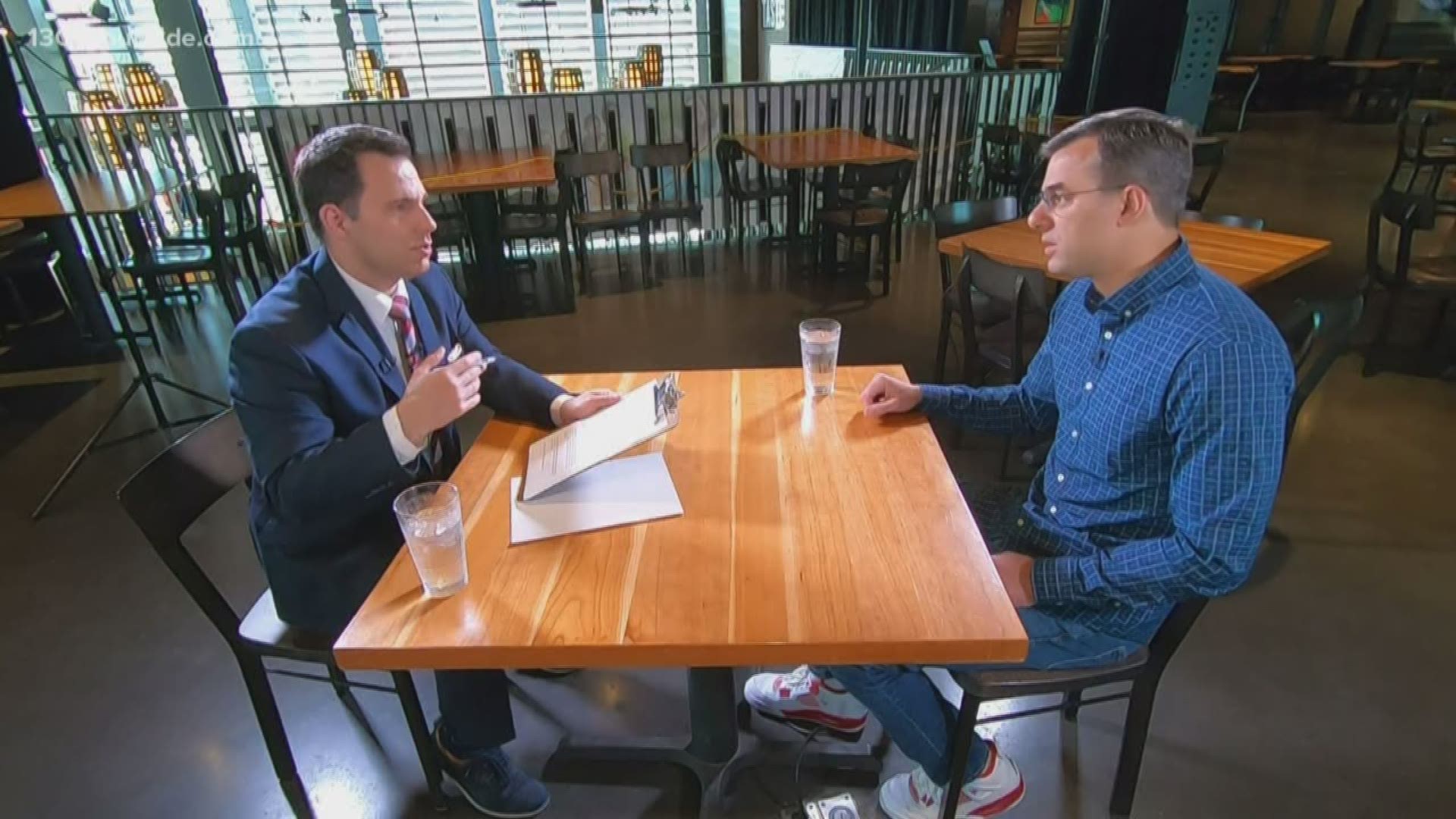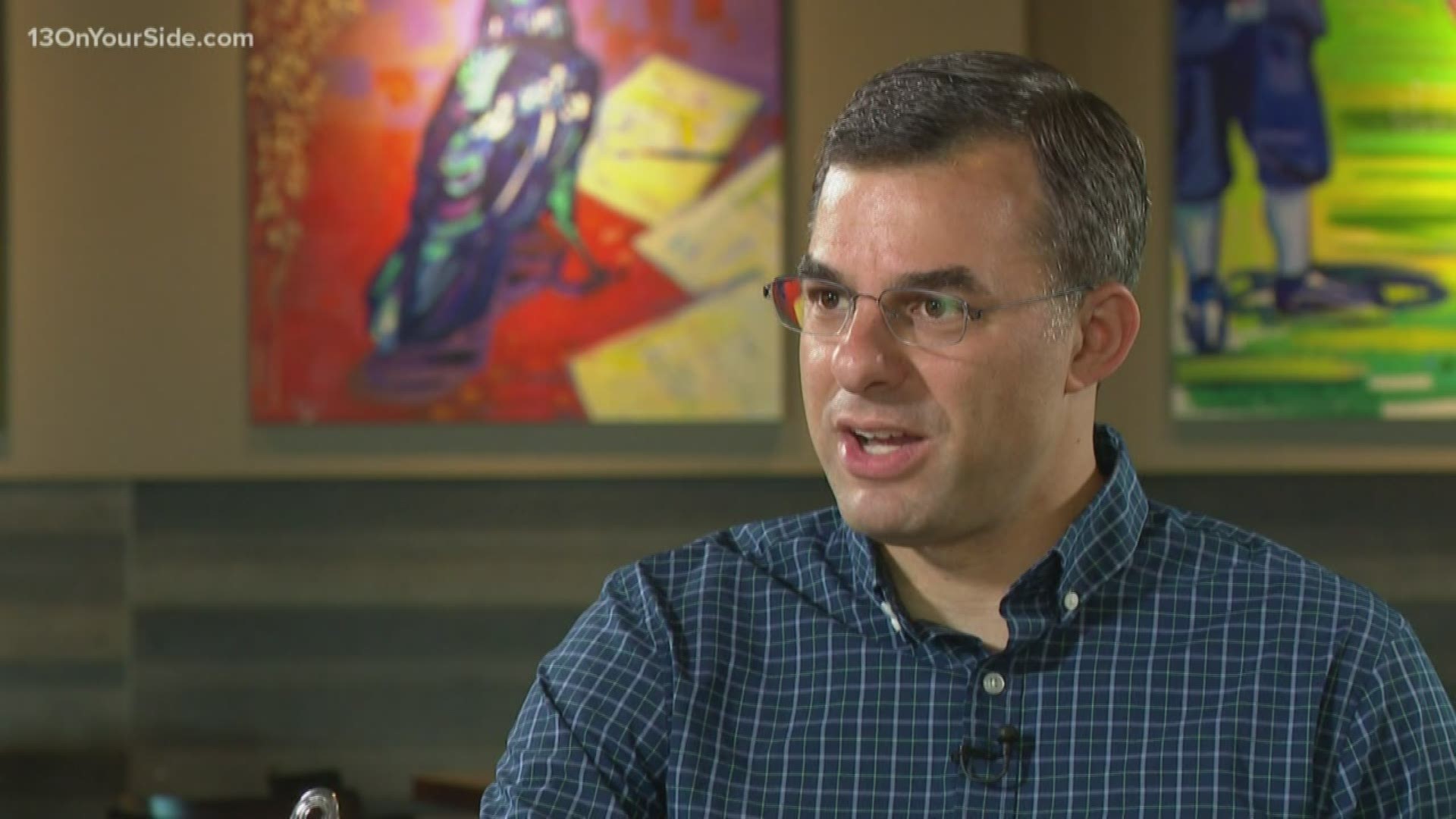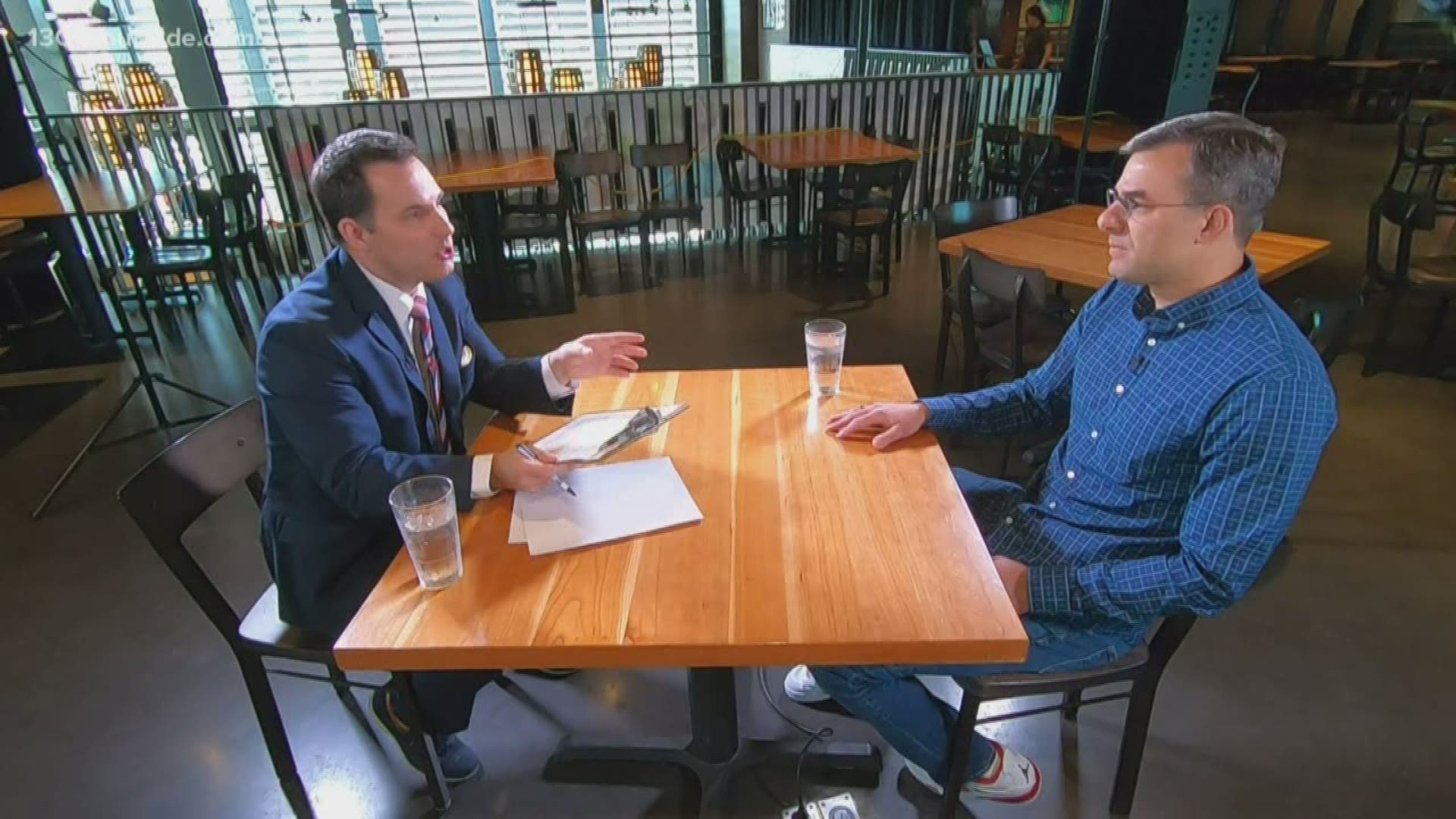GRAND RAPIDS, Mich. — Rep. Justin Amash (I-Grand Rapids) sat down with 13 ON YOUR SIDE Friday— just one day after he announced he is leaving the Republican party to become an independent.
The congressman published an op-ed in the Washington Post announcing his party change bright and early on the Fourth of July. In it, he said "Modern politics is trapped in a partisan death spiral, but there is an escape."
Amash represents Michigan's 3rd Congressional district, which covers four counties in West Michigan—including the city of Grand Rapids. He says he plans to run for Congress again as an Independent. Until Thursday, the seat had been filled by a Republican since 1993.
Michigan has never had an Independent member of Congress or the Senate.
In this sit down interview with the congressman, he talks about his decision to become Independent, he shares his criticisms of the current partisan politics in Washington, and he discusses his constituents.
"I want people to see that I’m going there to represent the entire district, the entire community, to follow the Constitution, and also try to help get people to change their mindset on things."
Watch the entire interview here:
(The full transcription is below the video)
Nick: I want to start by going to the end of your op-ed in the Washington Post. You wrote “Today I’m declaring my independence and leaving the Republican party.” Do you have any plans in the future to join any other political parties?
Amash: I don’t have plans at this time. My job is defending the Constitution, representing this district and that’s what I’m focused on. I’ve said many times, I don’t rule things out in terms of where I might go in my political work.
I want to do what I think is best for our country, and if there is something I can offer then I am willing to consider that.
RELATED: Justin Amash quits Republican Party
Nick: There is a criticism, and I know you’ve heard this before, that you were never a Republican to begin with. You were a Liberterian and you jumped on a Republican ticket to get elected to office. What do you say to those critics that say that?
Amash: Well, I’m a Constitutional conservative. I’ve been Liberterian throughout my life. When I ran for office the first time, I made it very clear what my principles were. I believe in standing up for the Constitution, defending people’s rights, protecting liberty, and that’s what I’ve done. I’ve been elected cycle after cycle on those principles. When I go to run for office, I’m not running by telling people, ‘Hey vote for me because I’m a Republican.’ I run for office saying, ‘Vote for me because these are things I’m going to stand on and these are the principles, I’m going to follow.’
Nick: Back to your op-ed now. Earlier in the piece, you write “In recent years, though, I’ve become disenchanted with party politics and frightened by what I see from it.” What specifically frightens you?
Amash: What frightens me is people turn into zombies. They go to Washington and they will be telling me stuff privately that is very different from what they say publicly. And I believe you have both parties now falling in line with their respective leadership teams almost 100 percent of the time because they are scared of their leadership teams and they scared of what will happen back home with their primaries and from people at town halls or social media. And that is a very dangerous place for our country to be in. I don’t think we want a system where people just follow one person, follow the leader of their party on everything.
We need Congress to be a deliberative body. We need people to go there and represent their constituents, follow the Constitution and not follow one person. And do what’s right for our country. We don’t really have that right now.
Nick: Does President Trump or does this presidency frighten you?
Amash: Well, I would say the president is a symptom of this problem. I don’t think he started the problem. I do think he helps fuel the problem. A lot of his rhetoric, which is often really hostile especially toward Democrats, a lot of his rhetoric that is hostile even toward people in the Republican party is dangerous. He is punching down for seemingly no reason and telling people to get angry about this thing or that thing when at times he is blowing things out of proportion. I think it is important that the person at the top, the president, set an example for the country. I try to set an example with my work. I try to be a role model for people to show how you might operate in this office where you don’t have to be hateful toward people. You don’t have to be angry about everything; you don’t have to be mad at everything. There are certainly times to be upset, at times, with what is going on. But we have to be constructive in the way that we talk to each other. Right now there is a lot of dehumanizing going on where people treat anybody who doesn’t agree with them as subhuman.
Nick: In another section of your op-ed you write, “Instead of acting as an independent branch of government and serving as a check on the executive branch, congressional leaders of both parties expect the House and Senate to act in obedience or opposition to the president and their colleagues on a partisan basis.” My question is when hasn’t that been the case? You are student of political history. You quoted George Washington in your piece how he warned against partisan politics, but talk to Michael Beschloss or Jon Meacham, they’ll give you example after example in the 1800s, the early days of the country when partisan politics were awful.
Amash: Yeah, and when you look back, you’ll find places in history where you had very bad partisan politics. The early points in this country where you had the Federalists and the Democrats and Republicans fighting against each other. You have the period before the Civil War, so you had lots of times when there were tremendous amounts of partisanship dominating the landscape. But what you have today, I think, is unique at least in modern times. You have the parties virtually 100 percent locked up behind a particular leader. Democrats stand behind Nancy Pelosi almost 100 percent—I’m talking in D.C. You have Republicans standing behind the President almost 100 percent, and there is very little room for any kind of dissent. It used the be the case 30, 40 years ago that you had more of a mix in the Republican party, and in the Democratic party. You could have people take positions that were contrary to, say party leaders, and still do just fine. They would get by with good relationships with their colleagues. People at home didn’t worry about it that they had a representative who was straying from the party. In fact, there was a time when people really admired that more. Now, the most politically active people really don’t want that kind of thing. They want the two parties to be fighting each other. They think it’s a war and one side must defeat the other. And there are a lot of Americans today who are bystanders to that. I think most people do not actually relate to this fight between the parties.

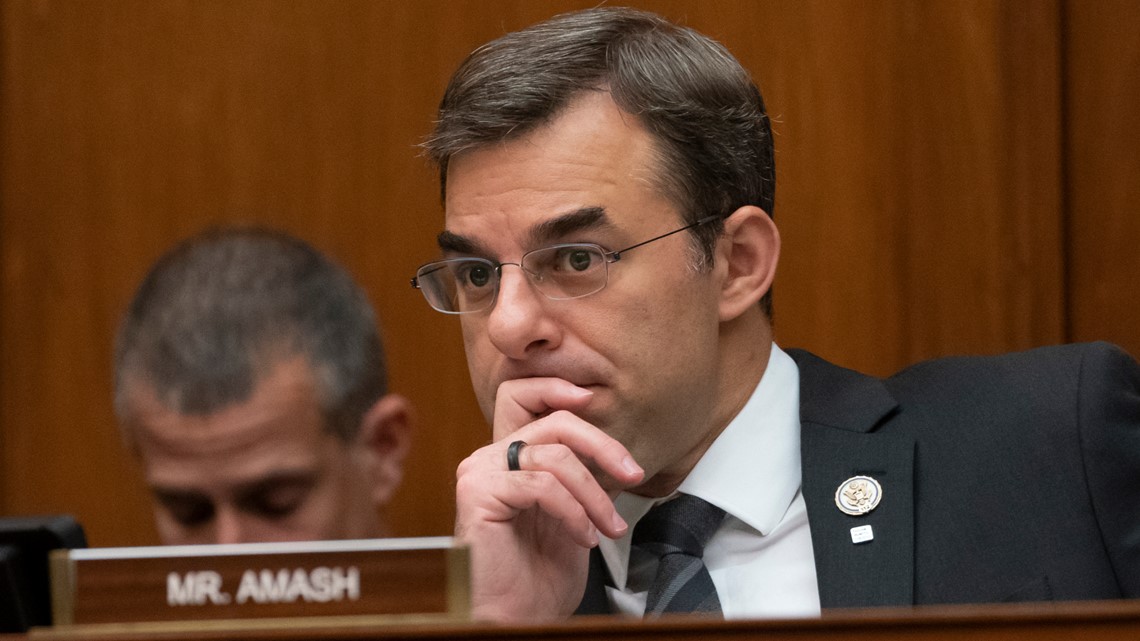
Nick: Another section in your op-ed, “Americans have allowed government officials, under assertions of expediency and party unity, to ignore the most basic tenets of our constitutional order: separation of powers, federalism and the rule of law. The result has been the consolidation of political power and the near disintegration of representative democracy.” How will leaving the Republican party help fix any of that.
Amash: Well, I want to set an example for people. I want people to understand that you don’t have to be beholden to one party or the other party. You can go to Washington, and you can represent your community. You can follow the Constitution and do what’s right for the people. What I see from so many of my colleagues is in private, they will say, they disagree with this thing. They disagree with that thing. They have very serious criticisms of the president, but then they will go on TV and say the opposite. That is really dangerous. I think people should go there and say what they believe and fight on the basis of their principles, on the basis of ideology. In fact, in some sense we have too little ideology going on in Washington. There is too much partisanship and too little ideology. I want people who are very progressive to come there and fight for their principles. I want people who are very conservative to fight for their principles. I want others to fight for their principles. Let’s have it be a deliberative process and let’s see how it shakes out, and we will better reflect the will of the people through the process.
Nick: Do you think you are being punished or have been punished by the Republican party or Republican leadership for standing up for your principles.
Amash: Well, I don’t like to think of it in terms of punishment. I knew what I was getting into. I’ve been an independent member of Congress for many years. Serving in the Republican Party, I thought that maybe I could work to change the Republican party from within. What I found was, it is too rigid. The system is too locked in from the inside. The only way to change it is from the outside, so I need people at home to start paying attention to what is going on in Washington. I need to educate people at home what is going on.
Nick: You may have just answered my next question, but I’m going to ask it anyway. You wrote, “Modern politics is trapped in a partisan death spiral, but there is an escape.” What is the escape?
Amash: The escape is for people at home to get educated. For people at home who are not really aware of what is going on in Washington to pay attention to it. There are lots of people at home who have decided they don’t want to be a part of these politics, so they’ve said, ‘look I’m going to let the Republicans and the Democrats fight it out. And I’m not going to worry about it.’ And I think they do need to be worried because it affects their lives. It’s easier for people to say, ‘well I don’t want to get my hands dirty with these Republicans and Democrats, so I’m just going to stay out of it.’ But I really need people to get engaged, to understand what’s going on because if we don’t our country is in trouble.
Nick: How do you get them engaged?
Amash: I think it’s my job, as a person who is in the public sphere and as a person with influence, to go out and talk to people. And that’s what I’m going to spend a lot of my time doing. I’ve done that at my town halls. I’ve tried to engage people on the problems that are going on in Washington and how we can address them. The number one thing that people really don’t think about at home is how the process—and I’m sure the process of Lansing, as well, I served there before I was in Congress—how the process really makes it difficult for our representative system of government to work. How the process is so broken that over the last few years, members of Congress can’t even offer amendments openly on the house floor. They have to submit amendments to the speaker of the House to be approved before you can have a vote on it. That’s not the way it’s supposed to work. It’s supposed to be a very open, deliberative body where people can offer their ideas and we can debate the ideas. And from there, whatever happens, happens and it reflects the will of the people. Every two years, you can elect new people if you don’t like the outcome. People tend to focus so much on the substance of Washington. What is the particular messaging fight of the day. And I think that’s actually a trap set up by the leaders of both parties to get people distracted from what is actually going. Which is a few leaders on each side are controlling the whole thing, and basically trying to extend their own power.
Nick: I want to get back to the genesis of this now. Did your splintering with the Republican party begin when you started criticizing then-candidate Trump or does it go back before that?
Amash: I’ve had issues with the establishment of the Republican party for awhile. I think that they have basically been providing the fuel for what we have today. For many years, they didn’t listen to the American people. They closed down the process. It started with John Boehner. But compared with Paul Ryan, compared with Nancy Pelosi, John Boehner was a better Speaker of the House. Which is a hard thing to say. But now in retrospect, I can see it. He actually kept things more open than they did. But still much more closed than his predecessors.

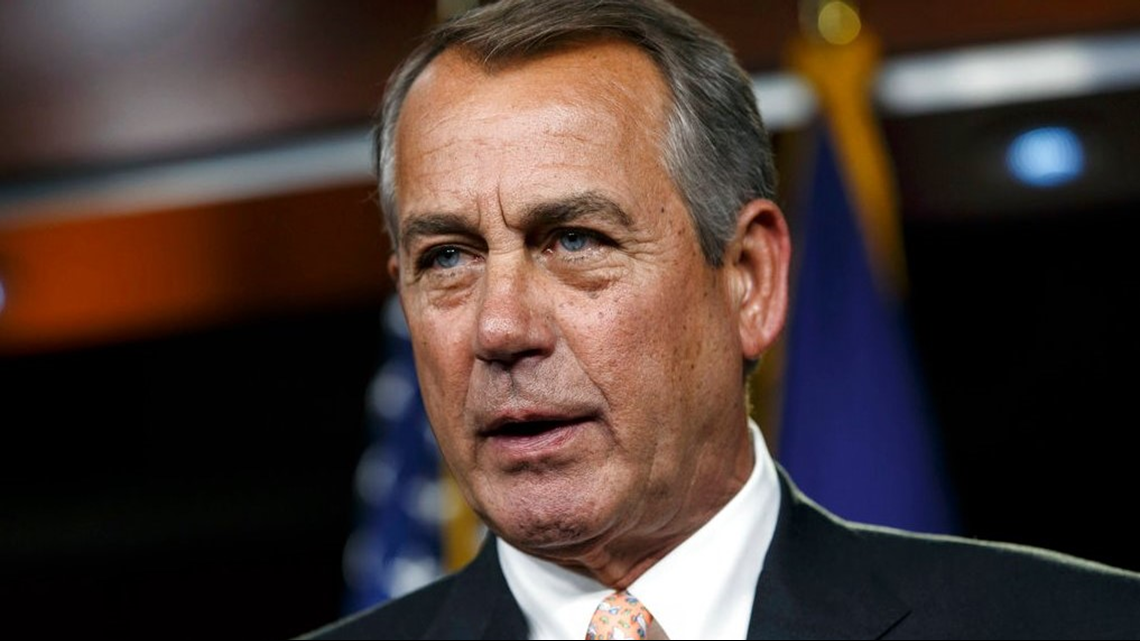
Nick: That’s ironic because one of John Boehner’s criticism of the tea party was that they wouldn’t let him negotiate or strike deals with President Obama. And you were one of the people who came in on the Tea Party wave.
Amash: I don’t think that’s accurate. I think what John Boehner said at the time was not correct. Within the Tea Party movement, within that group of people that got elected to Congress, of course there are all sorts of people: People who are open to compromise and people who do not want to compromise. And I was always open to compromise. I would never compromise my principles. But in terms of getting something instead of getting nothing, I was always for that. If something moves us in the right direction, I was always for that. So John Boehner’s criticism was right in some ways, but was wrong in many other ways.
Nick: You felt it was too broad?
Amash: Too broad. What really set the stage for today is the kind of operation that happened under John Boehner gradually. So in the beginning of his service, the place was more open than at the end. As you near the end of his time in Congress, the place really started to close down. You could see at the time that we were headed in a very dangerous direction. That in the future, there would be some kind of backlash, and the backlash would be something like Donald Trump. And now instead of actually draining the swamp, as the president claimed he’d do, Donald Trump has basically used the apparatus that John Boehner and Paul Ryan set up for him to control the whole system. Donald Trump is basically the one closing down the whole process along with the Republican party leadership and now Speaker Pelosi trying to control her side. So that you have a very dangerous mix where you only have a few people: the Speaker of the House, the President of the United States, and the Senate Majority Leader really control the whole thing.
Nick: On President Trump. In May, you tweeted out that you thought the Mueller report showed that he committed impeachable acts. What was the reception like among your then-Republican colleagues when you showed up to work the next day in Washington?
Amash: So it depended who you talked to. Actually, it was pretty typical. There was nothing that unusual about the reception. They expect me to be independent minded. They weren’t too surprised about it. But there were a few Freedom Caucus members who wished I would have given them more of a heads up. But I did what I thought was right, and I did it at the time I thought was right, which was not to wait so long past the release of the Mueller report that it wasn’t even relevant anymore to the conversation. I took the time I needed. And I thought it took a good month to review it. When I was through that month, I thought this is the right time now to say something.
Nick: Are you at all worried now that you’ve left the party about your committee assignments being taken away when you get back?
Amash: I’m not worried about it. No. I expect they may well be, but I’m not worried about that.
Nick: Do you still intend to caucus with Republicans?
Amash: No I do not.
Nick: Who are you going to caucus with?
Amash: I intend to be an independent representing my district. I will represent my constituents the way I think is right, which is to follow the Constitution and make sure everyone in the community is represented. Not just one party or the other party, which is how it is in Washington these days, I want to represent every member of my community.
Nick: Last time we spoke, before your last election, you told me you actually had some allies in the White House including current chief of staff Mick Mulvaney. Does that relationship still exist and have you spoken with him lately?
Amash: I haven’t spoken to him over the past few weeks, but we reach out from time to time. But in the past few weeks we haven’t spoken.
Nick: What do you think he’s going to say the next time you see him?
Amash: I don’t know. I don’t want to speak for him.
Nick: Your Congressional colleague here in West Michigan, Bill Huizenga, he said this multiple times: anyone in the House of Representatives who wants to draw up articles of impeachment is perfectly free to do so. If you feel so strongly that President Trump should be impeached, why haven’t you written up those papers?
Amash: At the end of the day, the Speaker of the House is in total control of the House. If that were not the case, then we would be in a different place. But as long as the Speaker of the House is saying, ‘No we’re not moving forward with this,’ it does not matter what articles you draw up. They’re not moving forward. I think the Speaker is taking a position that is frankly, not courageous, not the right thing to do. If she believes that President Trump impeachable offenses, and if she believes as she said that he should be in prison—she said that—then I think it’s insane not to move forward with impeachment. It’s absolutely insane. And I think she’s doing it to maintain power in the House of Representatives because she views it as something that is maybe a threat to her own power in the House. Maybe she views it as something that will actually benefit President Trump, and what I would say to her is, it doesn’t matter whether it benefits President Trump or doesn’t benefit President Trump politically. It’s about doing the right thing. If you believe there are impeachable offenses, then you as the Speaker of the House have a responsibility to let those actions go forward.

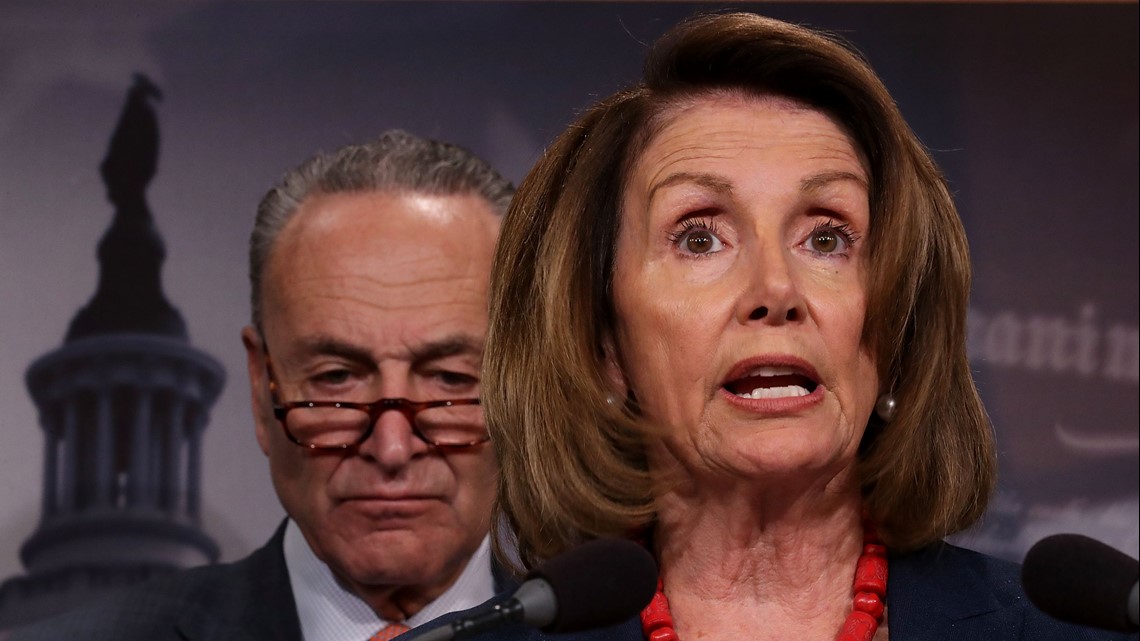
Nick: Another Michigan colleague, Rashida Tlaib reached out to you on Twitter and said ‘if you’re interested in impeachment, come talk to me.’ Did you ever reach back out to her about that.
Amash: I haven’t talked to her about that specific tweet. Like I said, if we move forward with something it’s only because the Speaker of the House allows it to move forward. And when the Speaker has decided she wants to be responsible and do what she claims she believes, which is to hold the president accountable, then we can talk about articles of impeachment.
Nick: You’ve gotten more publicity and attention the past couple of months than I imagine you’ve gotten in your political career, both positive and negative. How is your family handling all this attention?
Amash: My family is great. My family is fantastic. My kids are great. They find some of what the president says funny, including his insults. So we’re all doing really well. I’ve got a great extended family as well, so we’re all happy.
Nick: You are running for re-election for your district?
Amash: Yes.
Nick: You haven’t had a primary challenger since 2014. Up until yesterday, you had four. And the perception by many is that you jumped out of your party to avoid a primary fight. What do you say to those people? Is that a valid criticism?
Amash: No. That’s a primary I can win and I would win. You have a lot of people dividing up the pro-Trump vote saying they are owing their allegiance to Donald Trump. And I’m saying, my allegiance is to the Constitution and to the people of the district. And I think it’s easier to see which position wins out in the primary.
RELATED: Afendoulis enters race against Amash
Nick: We’ve seen this before. Can you understand why maybe people think that’s what you’re doing?
Amash: Yeah. For me it was just being fed up with this system. This is something that I’ve been thinking about for a long time. I’ve thought about it in past cycles. But at this point in history, I think it’s important that someone say, enough with these two parties. We need someone to go and set an example for people and be representative of everyone. The problem I faced as a Republican was, there were a lot of people in this district who no matter how independent I was, no matter what I did to represent everyone would always label me with the same brush as everyone else and say, ‘Well, you’re a Republican and I don’t trust you.’ And I want to break that cycle of mistrust. I want people to see that I’m going there to represent the entire district, the entire community, to follow the Constitution, and also try to help get people to change their mindset on things. That not every Republican is bad and not every Democrat is bad. There are good and bad things that each side does. And we have to accept people on the whole and try to work with others and not always hate on others because their different.
Nick: So you’ve been thinking about leaving the Republican party for years?
Amash: I’ve been thinking about it for awhile, yeah.
Nick: When did you finally make the decision that ‘I’m leaving?’
Amash: In recent weeks and months, it’s become clear to me that we need a new direction. So certainly, in the most recent Congress—in this current Congress—is where I got to the point where I said, I don’t think I can keep doing it the way I’ve been doing it. I think I have to try doing something else, to try to make a difference in a different way.
Nick: Was it before or after the release of the Mueller report?
Amash: It was before the Mueller report. In fact, I was really hoping not to find anything in the Muller report because I didn’t want to get bogged down in all this whether it’s about the Mueller report or not about the Mueller report. So when I read the Mueller report, my hope was everything would come out clean. And actually, as we started to read it, we got through Volume 1—my staff and I were reading it, each of us. And I thought, ‘OK, there’s nothing too problematic for the President himself here. But then as I went into Volume 2 with the obstruction of justice evidence that was presented, it got to the point where I said there is a real problem here. There is a pattern of behavior, there is clear evidence that would be indictable. And I don’t really have any choice but to say what is right, and that is there is impeachable conduct. I was hoping to find nothing in there. I didn’t want to go down that road. But look, I’ve got a responsibility to my constituents to say what’s right. I would have loved to find nothing in there and still become an independent.
Nick: You’ve always considered yourself a Libertarian. Why not join the Libertarian party? It would certainly help you fundraising, going into a re-election campaign.
Amash: Right now, I think the right thing to do is to make sure that people know I’m representing everyone. I think if you switched to another party, you send another kind of message. My issue really is the two party system as its set up right now with the Republicans and the Democrats—not only dominate everything but that the parties themselves are so behind one leader. President Trump on the Republican side and Nancy Pelosi on the Democratic side. Parties in themselves aren’t the problem. It’s this undying loyalty to party, and that is the problem. And I want to send the message that we need someone who is going to be independent.
Nick: Why publish your op-ed on the Fourth of July? Was there symbolism there? Did it have anything to do with the President’s parade?
Amash: It had nothing to do with the President’s parade. Because it’s Independence Day and I wanted to remind people of the spirit of this country. This country was founded on the idea of independence. It was founded on the idea of securing the rights of the people. That we’d institute governments that secure the rights of the people. Here we are in 2019, and the government is really failing at that because you have this two party duopoly. They control everything. They have partisanship dominating the system to the point where people’s rights are no longer being protected. So I thought it was the right day to do it because it was important to tie it into that message about what this country is all about.
Nick: If all of this: criticizing the president, saying there are impeachable acts, leaving the GOP, if all of this ultimately costs you your seat would it have been worth it?
Amash: I’m not worried about whether it costs me my seat, doesn’t cost me my seat. I believe in life you have to do the right thing. And I talk to candidates right now who say to me: ‘Justin, I just have to play along right now. Show that I like the president, then when I get elected, I can be independent.’ That’s what they tell me. I tell them that’s not going to happen. If you want to play games right now when you’re running for office, when you’re elected you’re going to be playing the same games. And I didn’t run for office to play games. I ran for office to represent the people. And that’s what I intend to do. And if the people want to vote for someone else who is going to play the games, that’s up to the people. I have a lot of faith in this community. I’ve been running for office here for several years. I understand this community and I know this community. And this community wants people who are going to be independent minded, who are going to do the right thing. They’re not looking for a President Trump yes man or a Nancy Pelosi yes man. They want someone who is going to go there and do the right thing for all the constituents. And that’s what I’m going to do to the end wherever it takes me.

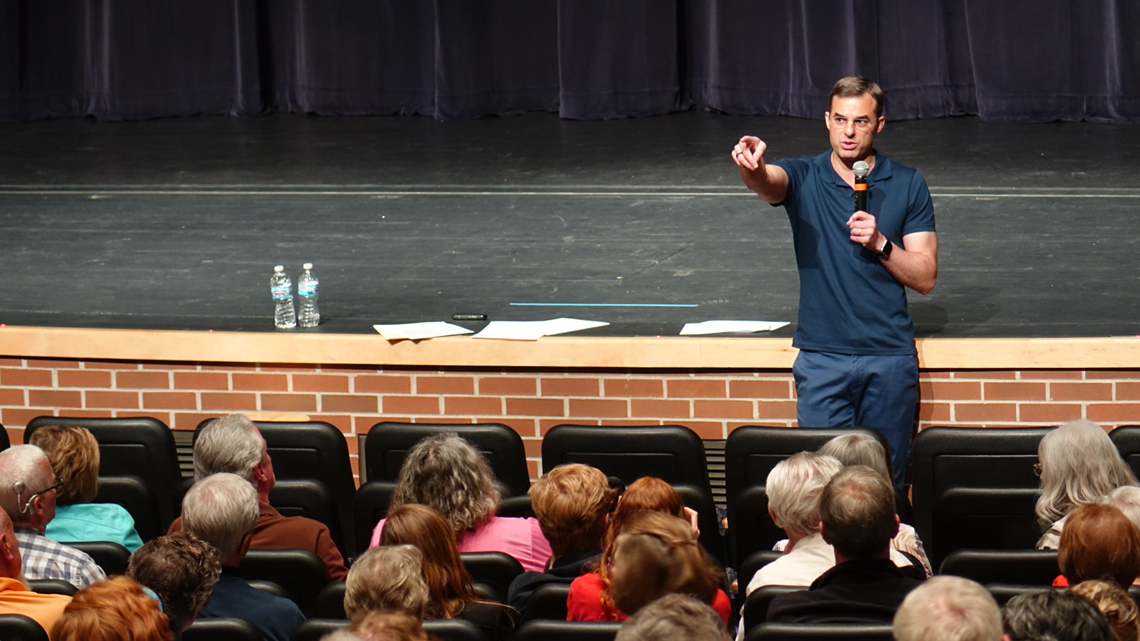
Nick: At your town hall, someone asked you why you don’t run as an Independent and your answer was it is hard to run as an Independent on a straight-ticket in Michigan. Do you see that as a challenge moving forward?
Amash: It is very difficult to win as an independent in the state of Michigan. There is no doubt about that. The parties really dominate the system and they’ve set up a system designed to benefit them—straight ticket voting. There’s ballot access issues, but I don’t really think that’s problem for me. At the end of the day though, enough people care about what is going on in Washington, enough people care about this particular election that they will be willing to go down the ballot and vote for the Independent candidate. I think they will be willing to do that, and that’s why I’m going to go forward with it. I wouldn’t run for the seat if I didn’t think it was something I could win. I very much believe it is winnable.
Nick: Has anyone talked to you seriously about running for president?
Amash: People talk to me about running for president all the time. When you say seriously, there are people who have approached me, but I haven’t had any serious conversations with them about that.
►Make it easy to keep up to date with more stories like this. Download the 13 ON YOUR SIDE app now.
Have a news tip? Email news@13onyourside.com, visit our Facebook page or Twitter.

